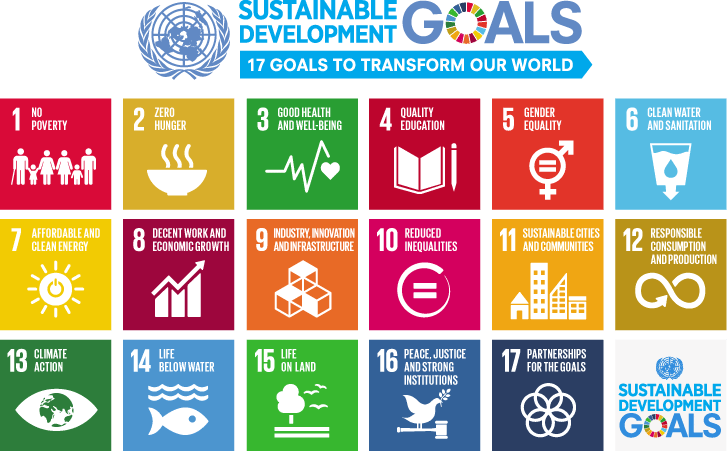5 Econ development

This section of the Cambridge IGCSE Economics (0455) syllabus examines aspects of economic development. Unit 5 covers the following four topics (click on the relevant hyperlink to access the InThinking resources for this section of the syllabus):
Research task - The UNDP Sustainable Development Goals (SDGs)

Source: UNDP
The Sustainable Development Goals (SDGs), part of the United Nations Development Programme (UNDP), were adopted by all UN Member States back in 2015 as a universal call to action to end world poverty, protect the planet, and ensure that all people across the globe enjoy peace and prosperity by 2030.
Read more about the United Nations Development Programme’s Sustainable Development Goals here and here (from the website of the United Nations), making links to aspects of social sustainability. Present your findings as a timeline.
Students can also refer to this short video about the SDGs:
A brief account...
American marine biologist and conservationist Rachel Carson’s Silent Spring (1962) suggested that economic prosperity through great consumption, expenditure and trade may have adverse effects on the natural environment.
In 1968, several heads of states, diplomats, scientists, economists and UN bureaucrats founded the international group ‘The Club of Rome’. In 1972, this group published a report on the harmful impacts of economic growth and prosperity.
Following the Club of Rome's report, several academia from the Massachusetts Institute of Technology (MIT), the private research university in Cambridge, Massachusetts, USA, prepared a paper titled ‘Growth and its implication for the future’ (1975) for the United States Congress.
In the late 1980s, the United Nations World Commission on Environment and Development (UNWCED) published its groundbreaking report ‘Our Common Future’ (1987), commonly referred to as the Brundtland Report. The report coined the term sustainable development as:
“development that meets the needs of the present without compromising the ability of future generations to meet their own needs."
In 1987, the Montreal Protocol, an international treaty, was adopted in order to protect the ozone layer by phasing out the production of numerous substances that scientists found to be responsible for depletion of the ozone layer. These substances include the use of Chlorofluorocarbons (CFCs) found in fast food packaging used by multinational companies including McDonald's and Burger King.
In 1992, the UN Conference on Environment and Development (UNCED), also known as the Earth Summit, was held in Rio de Janeiro, Brazil. Agreements were reached on the Rio Declaration, a non-legally binding agreement on conservation and sustainable development of the forestry industry.
The World Trade Organization (WTO) was formed in 1995, accounting for the vast majority of international trade agreements across the globe. Its protocols include consideration of the impacts of trade on the environment and sustainable development.
In 1997, nations agree to the international pact on targets to reduce carbon emissions in the Kyoto Protocol. This international treaty, signed in Japan, extended the United Nations Framework Convention on Climate Change (UNFCCC) in 1992. The agreement commits signatory governments to reduce their greenhouse gas emissions in further attempts to protect the planet.
The United Nations’ Millennium Development Goals (MDGs) are finalized in 2000.
The United Nations Conference on Sustainable Development (UNCSD) holds its third international conference on sustainable development at the Earth Summit in 2012 (called Rio 2012), aimed at reconciling the economic and environmental goals of the global community. The United Nations’ Sustainable Development Goals are formed, replacing the UN's Millennium Development Goals.
In 2015, the UN Sustainable Development Goals (SDGs), also known as the UN Global Goals, were adopted by all United Nations Member States. This is the most significant universal call to action for all member countries to end poverty, protect the planet and ensure that all people enjoy peace and prosperity by the year 2030.
Note to teachers:
Students are not expected to learn all of the UN SDGs although being able to understand the overview and purpose of these goals can help them to better understand the concept of sustainability. There are plenty of discussion points that can arise from this part of the syllabus, such as:
Why hotels around the world offer all-you-can-eat buffets.
Whether high-income nations can justify their overconsumption of goods and services.
Why the world's poorest people have minimal access to the planet's resources.
The pro's and con's of China's previous one-child policy relative to other means to control population growth.
The costs and benefits of an ageing population.
Return to the Unit 5 - Economic development homepage
Selected Pages

5 Econ development
5.4 Differences in economic development between countries Free
Unit 5.4 - Differences in economic development between countriesThis section of the Cambridge IGCSE Economics (0455) syllabus...

5 Econ development
5.1 Living standards Free
Unit 5.1 - Living standardsThis section of the Cambridge IGCSE Economics (0455) syllabus covers the following two topics....

5 Econ development
5.4.1 - Differences in economic development between countries
Unit 5.4.1 - Differences in economic development between countriesThis section of the Cambridge IGCSE Economics (0455) syllabus...

5 Econ development
5.2 Poverty
Unit 5.2 - Poverty"No society can surely be flourish-ing and happy, of which the far greater part of the members are poor...

5 Econ development
5.3 Population
Unit 5.3 - PopulationThis section of the Cambridge IGCSE Economics (0455) syllabus covers the following topics. Please click...

5 Econ development
Unit 5.4 Paper 1 MCQ
Unit 5.4 - Paper 1 Mutliple Choice QuestionsTo test your understanding of this topic in the IGCSE Cambridge syllabus (Differences...


